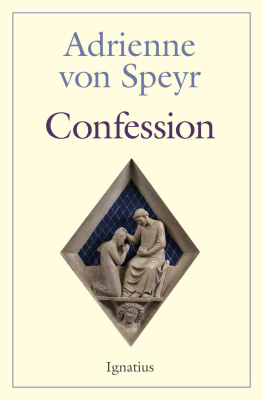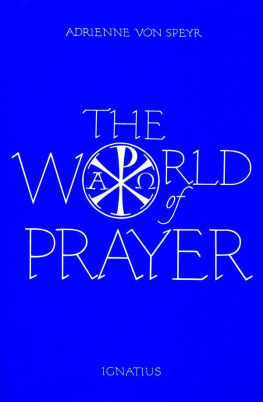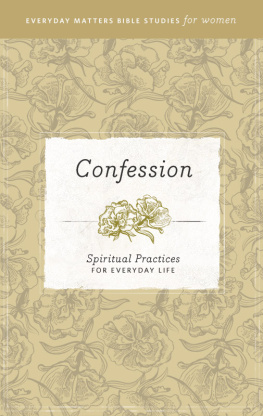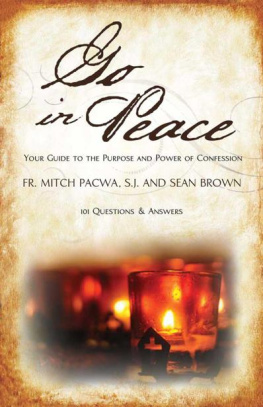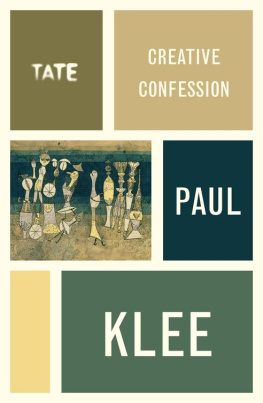CONFESSION
ADRIENNE VON SPEYR
CONFESSION
TRANSLATED BY
DOUGLAS W. STOTT
Second Edition
IGNATIUS PRESS SAN FRANCISCO
Title of the German original:
Die Beichte
1960 Johannes Verlag
Einsiedeln, Switzerland
Cover art:
Confession
Alberto Arnoldi (fl. 13511364)
Panel from the Campanile (post restoration)
Museo dellOpera del Duomo Florence, Italy
Scala / Art Resource, New York
Cover design by Roxanne Mei Lum
With ecclesiastical approval
1985 by Ignatius Press, San Francisco
Foreword 2017 by Ignatius Press, San Francisco
All rights reserved
ISBN 978-1-62164-182-7 (PB)
ISBN 978-1-68149-760-0 (EB)
Library of Congress Control Number 2016957598
Printed in the United States of America
CONTENTS
Trinitarian Foundation
The Confessional Position of the Son
The Incarnation
Immaculata , Conception and Birth
Childhood
Baptism in the Jordan
The Temptation
His Public Life
Desert and Mount of Olives
Passion
Holy Saturday
Easter
Its Institution
Binding and Loosing
Its Prehistory in the Life of the Lord
Childhood
Entrance into public life
The miracles
Jesus preaching
The Passion
From Easter to Pentecost
Bride and Confession
Confession within the Framework of the Sacraments
Original SinConfessionChurch
False Extremes
The Proper Relationship to Confession
Belief in the Efficacy of Confession
The Confession of Conversion
General Confession
The Devotional Confession
The Confession of Priests
The Confession of Religious
The confession of contemplatives
The confession of active religious
The Confession of Married Persons
The Legacy of the Lord
Preparation
Contrition
Resolution
Confession
Exhortation
Absolution
The Performance of Penance
The New Man
Confession and Daily Life
Confession and Mission
Confession and Prayer
Preparation
Hearing Confession
The Exhortation Spiritual Direction
The Prayers of Confession
After Confession
Bound Sin
The Seal of Confession
Francis
Little Thrse
Aloysius
The Mother of God
FOREWORD
Some years ago I had an experience with the sacrament of penance that I will never forget. It was a Saturday morning, and my parish was celebrating the first confessions of our second graders. As the children confessed their sins, their parents waited and prayed in the church. The parents seemed to be staring intently at their son or daughter, and the looks on their faces were unlike ones I had noticed in years past. No doubt, part of the reason for their staring was the shock that their children were that old all of a sudden. There was more, though. There seemed to be a look of longing in the faces of the mothers and fathers. It was as if I could see in parent after parent a desire to be there , in that seat, talking to a priest, having the chance to begin all over again, to start anew. Statistically, after all, scores of adults in the Church, for whatever reason, do not avail themselves of this great gift of mercy and are weighed down with guilt and fear.
One child came and, as is common, had written his confession on a piece of paper. I do not remember what he confessed, but I certainly remember what happened next. When he finished, I asked if I could have the paper upon which he had written his sins. He handed it to me, and I began to tear it up into small pieces. As soon as I began to do this, the boy began to cry, and he said in a tone that was full of relief and joy, Wow! He understood what had just happened in this sacrament. God had forgiven him, removed his guilt, given him the chance to begin again. And this was a second grader!
The following Sunday, I shared this story with the parish during Mass. Sure enough, as I had hoped and prayed, a good number of people who had been away from confession found their way into the confessional. One person had not been to confession in quite some time. When I asked her what had moved her to come back after all these years, she said, I wanted to see my paper torn up.
The amazing truth, though, is that the Lord God had desired to tear up her sins even more than she had. Over and over again in the Scriptures, God reveals this surprising reality: he loves to forgive, he loves to show mercy. Come now, let us reason together, says the Lord: though your sins are like scarlet, they shall be white as snow; though they are red like crimson, they shall become like wool (Is 1:18). Who is a God like you, pardoning iniquity and passing over transgression for the remnant of his inheritance? He does not retain his anger for ever because he delights in mercy (Mic 7:18). The scribes and Pharisees complained about Jesus, This man receives sinners and eats with them (Lk 15:2).
I have been a priest for more than twenty years, and for ten of them I resisted going to confession. I think it is important for lay people to know that priests struggle with the same issues everyone else does: fear, pride, embarrassment, and more. The evil one tries to isolate us and to make us feel as though we are all alone, the only one burdened by some particular sin. Adrienne von Speyr helped me more than anyone else to know that there is not only a communion of saints in the Church but a communion of sinners. I am not alone in my weaknesses, she showed me, and I therefore have no need to be afraid of confession.
I first came across von Speyr when I was in the seminary in the early 1990s. Few writers have impacted me the way she has. A friend of mine gave me a copy of John: The Birth of the Church , and from page one I was hooked. The Passion of Jesus has always been central to my prayer, and I had never come across anyone who had such insights into those moments in Jesus life and who propelled me to prayer the way she did. Shortly after I finished John , I bought a copy of Confession , and it similarly made a significant impact on me. I still have that first copy, and it is dog-eared, underlined, and highlighted to no end. I still use it every year in RCIA when it comes time to teach on this great gift that Jesus left to the Church on the day he rose from the dead.
There are countless passages in Confession that have made a lasting impact on me, but by far the most powerful is this one:
The sinner lives more or less in a state of sin; he does not really believe he can break with sin, but he feels its burdens and yearnsat least in certain momentsto be rid of it.... Confession catches the sinner in his fall away from God. All the sacraments do this in their own way and, in so doing, reveal something of the essence of the Church as a whole, namely, that she can be the means and the path of conversion. Confession, however, does this to an especially high degree and is thus a particularly clear symbol for the essence of the Church. It makes visible the fact that the Church turns to all sinners. Communion, accessible as it is to the purified, would have been too exclusive by itself and too alarming for sinners. I, as a sinner, know that I taint the communion of saints. I have been baptized, but I do not live according to the rule of baptism. I have been confirmed, but I am no apostle of Christ. I do attend Mass, but it remains incomprehensible to me. The sermon is either too sublime or too flaccid for me; I cannot relate to it. I recognize all the Churchs efforts on my behalf, she encourages, consoles, and admonishes me, but it does me no good. I have a great deal of experience with myself, and I know what I can and cannot do. Saints are shown to me, but I am simply not one. I live in sin, and as a sinner, I can always have the last word with the Church. But if I am told that the confessional is reserved for sinners, then I know that here finally is a place for me; it is precisely I who am meant. The pew there was made especially for me (106-7).
Next page
